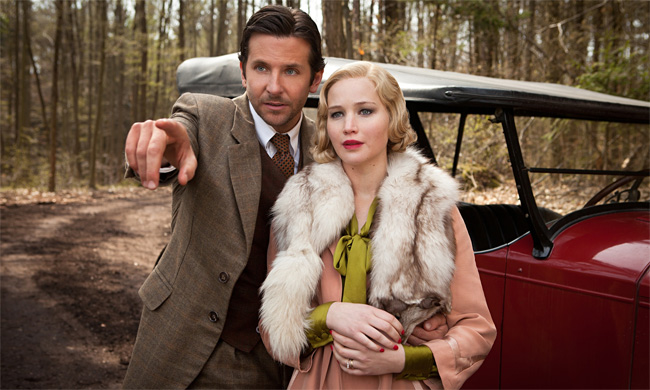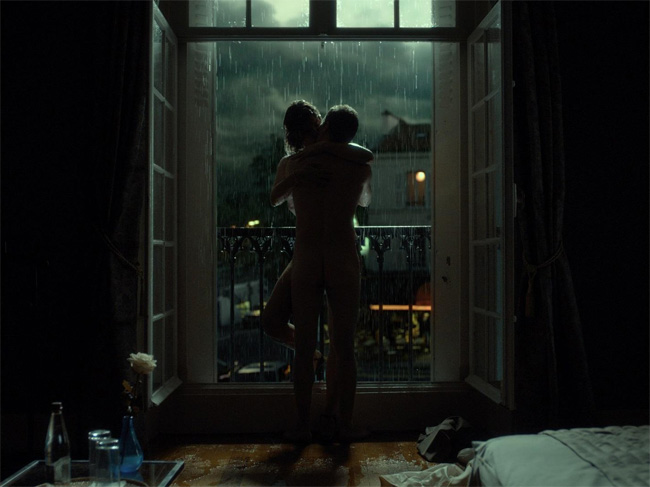 Serena
Serena
Written for the screen by Christopher Kyle
Directed by Susanne Bier
USA/France/Czech Republic, 2014
Based on a bestselling novel by Ron Rash, Serena, as brought to the screen by director Susanne Bier and screenwriter Christopher Kyle, feels like a husk of an adaptation even to one completely unfamiliar with the source material. It’s the sort of film that, at least in the form prepped for theatrical release, makes one inclined to believe its makers have completely lost the ability to tell a story. And it’s not like that ever seems like a deliberate stylistic choice, with Bier actually focusing on some thematic flourish off on the sidelines. Serena is always focused on its plot. Its perpetually rushed, choppily told, borderline confusing plot.
Part of the trouble in the telling is that the film’s a tonal mess. In her native Denmark, and with American cinema forays like Things We Lost in the Fire, Bier has thrived with tales pitched firmly in the vein of melodrama (In a Better World, After the Wedding, Brothers). In Serena, you can see her aiming for that sort of style in places, but then in others going for a great American greed epic sweep à la There Will Be Blood. Elsewhere there’s great focus on the dark love story elements, but then we’re suddenly treated to bizarre plot developments that turn Serena into what’s almost a period slasher movie – just try to comprehend anything about Rhys Ifans’ mysterious hunter and the paths his character takes after a truly baffling scene involving an axe and the distracting allure of a pregnant Jennifer Lawrence as the eponymous character.
Yes, Jennifer Lawrence is in this film, and her performance is easily the weakest of any of her leading parts to date, and co-star Bradley Cooper also flounders. Though both performers worked fine in the context of their last period movie together, the 1970s-set American Hustle, Serena makes the case that the era of The Great Depression might be a stretch too far for their stardom. Just as some performers of bygone eras thrived more in certain decades, so too are specific actors less suited to historical films of particular periods. As bright as their star power may shine in other works of late, Lawrence and Cooper, the latter seemingly aiming for a Clark Gable impression at times, just don’t work in a 1930s drama. There is no energy or chemistry to their turns here, and so Serena can’t even get by on the merits of its acting to distract from its deficiencies elsewhere. About the only thing it has going for it is some impressive production design and admittedly pretty photography from cinematographer Morten Soborg, not that the latter actually gets across anything atmospherically evocative to compensate for the feeble storytelling.
About that story, then. It’s Depression-era North Carolina and Cooper’s George Pemberton runs a successful timber business threatened by the local sheriff’s (Toby Jones) plans for a National Park. While away on some sort of business trip, his eye catches Lawrence’s Serena Shaw, introduced by a one-scene character as “beautiful, wounded” and “mad for trees”. This character then says “It’s a pity you don’t stand a chance with her.” Within the next four minutes of screen time, and with minimal dialogue, George and Serena are married and back in North Carolina. Did I mention the plot is rushed?
Making herself very much a partner for the lumber empire rather than simply the boss’ wife, Serena’s forceful nature rubs some of George’s close associates the wrong way, while captivating others for reasons never entirely clear (again, Ifans). Since murder at her insistence makes its way into the story later, one might be inclined to read Serena as a Lady Macbeth type, but that would require a degree of consistency or thematic resonance to be present in the character as adapted for the screen here, and what Lawrence and Cooper have to work with is basically a vacuum. People’s actions in this film are based solely around plot twists forced upon them, rather than any sort of discernible character motivation. The film speeds through each beat to get to the next scene, be it through montage overuse or just cutting conversations short, clearly hitting all the plot cornerstones of Rash’s novel that it apparently needs to, but sacrificing any semblance of depth behind the actions that take place. It is simply going through the motions, free of any organic development or context, and the end result is a completely dour, incoherent bore with nothing for the viewer to invest in.
Though set decades later, Serena comes across like how Heaven’s Gate probably appears to those who’ve not come around to re-evaluating it, and that’s not just to do with the film’s much-publicised production delays and re-edits (this started filming before Cooper and Lawrence’s first of what’s now three team-ups, Silver Linings Playbook, was even released). Based on the quality of what is in this cut, whether heavily compromised or not, it seems unlikely that Serena will receive the same film maudit treatment as Heaven’s Gate later down the line. There’s not enough meat to salvage on the bones of what’s been served.
— Josh Slater-Williams






